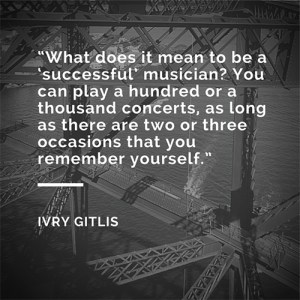 In our commercially-driven modern times “success” tends to be measured in monetary terms, and those people who have achieved the dizzy heights of a very large salary and financial security long into the future are generally regarded as “successful”.
In our commercially-driven modern times “success” tends to be measured in monetary terms, and those people who have achieved the dizzy heights of a very large salary and financial security long into the future are generally regarded as “successful”.
In fact, most truly successful people don’t measure their achievement in financial terms – some regard personal happiness or satisfaction and self-fulfilment as the definition of success, others the opportunity to live the life they truly want and deserve, and not just the life they settle for. For most of us, success is highly personal.
For musicians the definition of success is very broad, reflecting the diversity of musicians’ career paths, and the musicians I talked to in writing this article cited far more indeterminate definitions of success, beyond strictly tangible rewards. Many mention the experience of performing, of touching or moving the audience through the power of music, or the satisfaction of knowing, in concert, that one has done a good job. Very few of the musicians I spoke to mentioned monetary rewards. Given the precariousness of the musician’s career, not to mention the self-doubt that regularly looms, the thoughts of “am I good enough?“, I think an important key to a sense of personal success is not allowing others’ metrics to define your own success: maybe you don’t secure big concert fees, but if you are asked back to play with an orchestra you really admire, this can be a very positive measure of success.
Light Refracted I: Inward – Jennifer Higdon
The following quotes are from professional musicians (soloists, chamber musicians and orchestral players), composers and music teachers.
Looking into the audience and seeing someone clearly blissing out. Or crying. Preferably crying
Touching people. Making them pause from the hectic cacophony of life to take a breath
To be given a genuinely humane, fair hearing, removed from others’ varying needs to either ignore, gratuitously denigrate or, just as bad, over-praise…
Knowing I’ve done my very best. Creating something unique to me (and hopefully to others’ experience, too).
Feeling, in a concert, that the audience is actively listening to what you are playing.
Making music that is meaningful to some people.
To reach the moment of magic on stage regularly
When the aims and aspirations of preparation and practise are fulfilled in performance.
The ability to express one’s inner soul and communicate on a completely different level through the power of music is unparalleled in any other form of human communication and having the ability and determination to achieve this is immensely rewarding. – Paul Griffiths, organist
To be in line with what you do artistically. (Whether this works out commercially speaking is another question) – Francesco Tristiano, pianist
Of course we all need endurance and dedication to succeed. But sometimes, success can be measured on a more everyday level – like dealing with a less than perfect piano, or resisting the urge to run away just before the start of the concert! – Reiko Fujisawa, pianist
Les Baricades Misterieuses – Couperin/arr. Thomas Adès
More Opinion
-
 The Predictability of the 2025 Van Cliburn Competition Was Hong Kong's Aristo Sham the 'predictable winner'?
The Predictability of the 2025 Van Cliburn Competition Was Hong Kong's Aristo Sham the 'predictable winner'? -
 The Unpredictability of the 2025 Queen Elizabeth Competition Discover why these results have sparked debate among classical music fans
The Unpredictability of the 2025 Queen Elizabeth Competition Discover why these results have sparked debate among classical music fans -
 What Makes a Good Concert? A memorable concert requires four essential elements. Find out here
What Makes a Good Concert? A memorable concert requires four essential elements. Find out here -
 The Musician’s ‘Non-Negotiables’ Want to level up your music practice? Take inspiration from 'The Bear'
The Musician’s ‘Non-Negotiables’ Want to level up your music practice? Take inspiration from 'The Bear'




